THE ECONOMIST: What will happen if America’s election result for Donald Trump or Kamala Harris is contested?
The system is now stronger, but so is public mistrust of it.
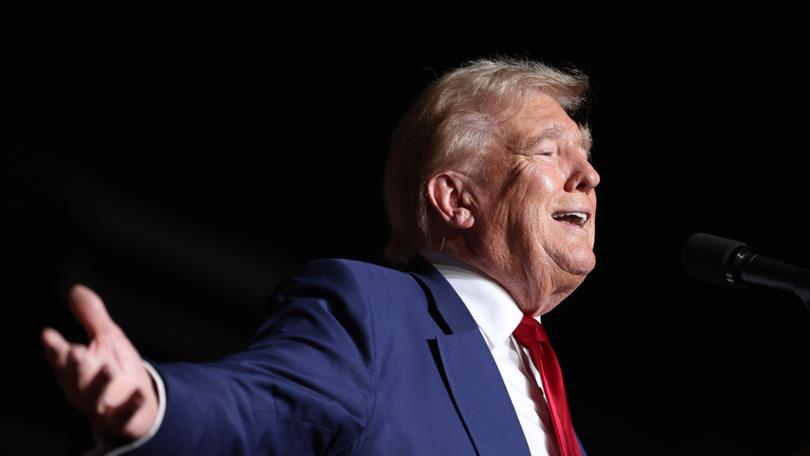
Gabriel Sterling is preparing for trouble: “Do we have concerns? Yes. Do we have backup plans? Sure. I don’t want to get too deep into them, because I don’t want people to have backup plans to our backup plans.”
Mr Sterling works for Georgia’s secretary of state, Brad Raffensperger, whose main job is to administer elections.
After the election of 2020, but before Congress had certified the outcome, Mr Raffensperger received a now-infamous phone call from Donald Trump, who was president at the time, asking for help to “find” enough votes to flip the result in the state in his favour.
Sign up to The Nightly's newsletters.
Get the first look at the digital newspaper, curated daily stories and breaking headlines delivered to your inbox.
By continuing you agree to our Terms and Privacy Policy.Mr Raffensperger demurred, and Mr Trump tried instead to overturn Joe Biden’s victory in other ways, without success.
Mr Trump and other Republicans are already signalling that they will dispute the result again this year if defeated. Election officials like Mr Sterling, as well as legions of party functionaries, lawyers and activists, are working on the assumption that there will indeed be attempts to subvert the election this year, and have been preparing accordingly.
How will the electoral machinery hold up?

The method the constitution prescribes for installing a new president is centuries old and showing its age.
Critically, Americans will not pick a president by majority vote in a single, nationwide election on November 5th.
Instead, voters in each of the 50 states plus the District of Columbia will choose a distinct slate of “electors”, who have pledged to support one of the presidential candidates.
The state’s election officials and governor must sign off on the results of this election before the electors vote, in turn, for a presidential ticket in December.
After the newly elected Congress is seated, in January, it will tally the electors’ votes, under the supervision of the vice-president, Kamala Harris, who is herself the Democratic nominee for president.
It is only once Congress has completed its count that the new president can be inaugurated, on January 20th.
This process has many drawbacks.
First and foremost, it can result in a candidate losing the popular vote but winning the presidency, as happened in 2000 and 2016, in both cases to the Democrats’ detriment.
Second, it encourages candidates to focus narrowly on the few states where the outcome is uncertain (there are only seven this year: Arizona, Georgia, Michigan, Nevada, North Carolina, Pennsylvania and Wisconsin).
Third, the constitution devolves to the states the authority to decide exactly how the electors are chosen, meaning that election rules are different in every state.
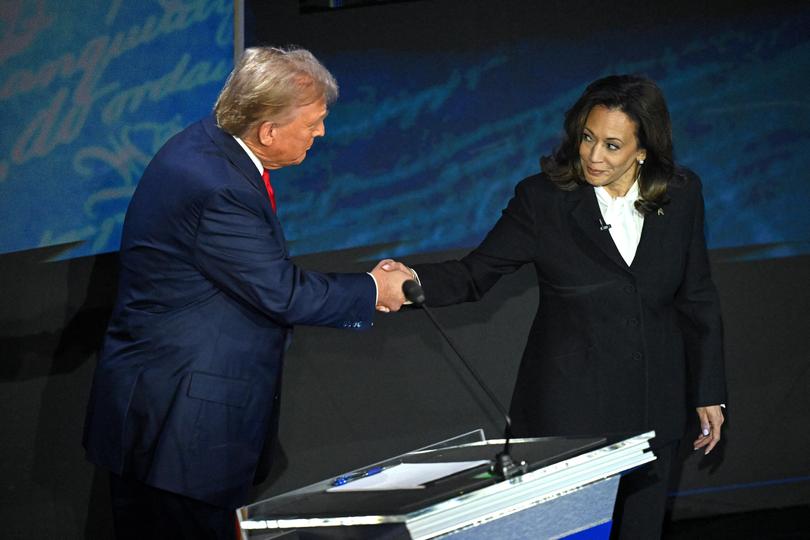
E pluribus plures
Maine and Nebraska allow their votes in the electoral college to be split between the candidates, whereas the other states are winner-takes-all.
Although most states require electors to vote for the candidate who carried the state, a few, including Georgia and Pennsylvania, have no rules to prevent “faithless” electors from opting for another candidate.
At a more mundane level, states have different deadlines for counties to report their results, for the election authorities to produce a statewide tally, for candidates to request recounts or lodge legal challenges and so on (see timeline).
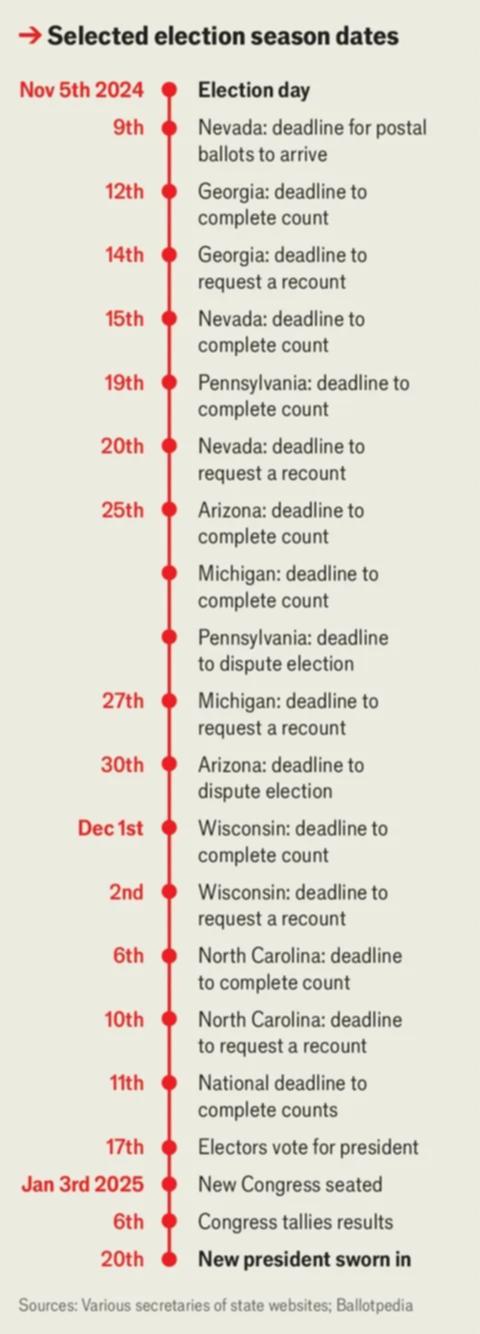
Worst of all, the process is absurdly drawn out, not under the auspices of any single authority and not always codified in detail, allowing for all manner of obstruction and delay.
In 2020 Mr Trump, having failed to get various state officials to change the local results, then tried to convince both Congress and his vice-president, Mike Pence, to reject the outcome.
When all else failed, he egged on a crowd that had gathered outside Congress to protest the “certification” proceedings, resulting in a deadly riot.
Should Mr Trump lose, he is all but certain to challenge the result again.
Disputing election defeats is a knee-jerk impulse for Mr Trump. In 2016 he claimed he came second in the Republican caucuses in Iowa only because Ted Cruz, the senator from Texas who beat him, had somehow rigged the proceedings.
He refused to promise to respect the outcome of the general election that year in which he was pitted against Hillary Clinton, insinuating that he could be defeated only by fraud. And even though it is he, rather than Mr Biden, who has been indicted both in federal court and in Georgia for trying to steal the election of 2020, he has never admitted that he lost it.
Singing from the same cheatsheet
Mr Trump is already preparing to dispute this year’s election. On social media this week he accused Democrats of “Cheating and Skulduggery” in 2020 and pledged that this year “WHEN I WIN, those people that CHEATED will be prosecuted to the fullest extent of the Law”.
At a rally in Las Vegas in June he insisted, “The only way they can beat us is to cheat.”
At the Republican convention in July Chris LaCivita, an adviser to Mr Trump’s campaign, declared, “It’s not over on Election Day, it’s over on Inauguration Day.”
Republican officials have helped prepare the ground by endlessly repeating the claim that Democrats are cheats and Mr Trump is a victim. In 2021 in Arizona, another battleground that Mr Trump narrowly lost, Republicans in the state senate launched an unprecedented partisan audit of ballots cast in the most populous county, inspiring wildcat audits elsewhere (none of which discovered anything much).
In 2022 Mr Trump played kingmaker in the midterm elections, encouraging primary challenges to Republicans who had rejected his claims of fraud and endorsing candidates who parroted them (Mr Raffensperger was a rare survivor of this purge).
Embracing Mr Trump’s lies about election fraud has thus become an article of faith in the Republican Party.
One of the slogans the Republican National Committee (RNC), the party’s paramount co-ordinating body, is using in its get-out-the-vote drive this year is, “Make it too big to rig.”
Christina Bobb, an adviser to the RNC, lawyer for Mr Trump and advocate of the spurious recount in Arizona, has written a 270-page book called “Stealing Your Vote”, which purports to explain how Democrats rigged the presidential election by stuffing ballot boxes.
Over the past four years Republican-controlled state legislatures have been tightening voting rules, ostensibly to prevent another stolen election.
Arizona’s legislature has passed a new law requiring that the envelopes in which postal ballots arrive be counted by hand (machines tally the ballots themselves), to make life difficult for election-riggers.
In Georgia cheerleaders for the notion that Mr Trump was cheated passed a law removing the secretary of state (Mr Raffensperger) from the state board of elections, which helps make election rules. In the name of “election integrity”, the board then passed a rule allowing local officials to undertake “reasonable inquiry” into claims of fraud before they certify results from each county.
Observers worry Republican officials will use the new rule as a pretext to refuse to certify disappointing results.
At a rally in August in Atlanta, Georgia’s capital, Mr Trump praised by name the three members of the board who had pushed through the change, calling them “pit bulls fighting for honesty, transparency and victory”.
Janelle King, one of the three, says allowing reasonable inquiry will improve trust in the system. “There’s no benefit to us to steal an election. There’s no benefit to me to help (Mr Trump),” she insists.
The RNC is involved in more than 100 lawsuits over election rules around the country. “While Democrats continue their election interference against President Trump and the American people, our operation is confronting their schemes and preparing for November,” says Claire Zunk, a spokeswoman for its election-integrity unit.
“Should the Democrats choose to continue their attacks on election safeguards through Election Day, we will be prepared to litigate and ensure the election is fair, transparent, legal, and accurate.”
“It’s not unusual to see some litigation ahead of a major election,” notes Liz Avore of Voting Rights Lab, which tracks changes to election law, “but the sheer volume that we’re seeing just two months before election day and this intense focus on purging voters from voter lists is not the norm.”
She points to a lawsuit in Arizona to remove 500,000 entries from the state’s voter rolls as an example of the lengths to which the Republican Party is going.
The rhetoric Republican functionaries deploy in these legal complaints is consistently overheated. In August the RNC sued North Carolina’s electoral bureaucracy twice in one week, alleging that it had “once again failed in its mandate to keep non-citizens off the voter rolls”.
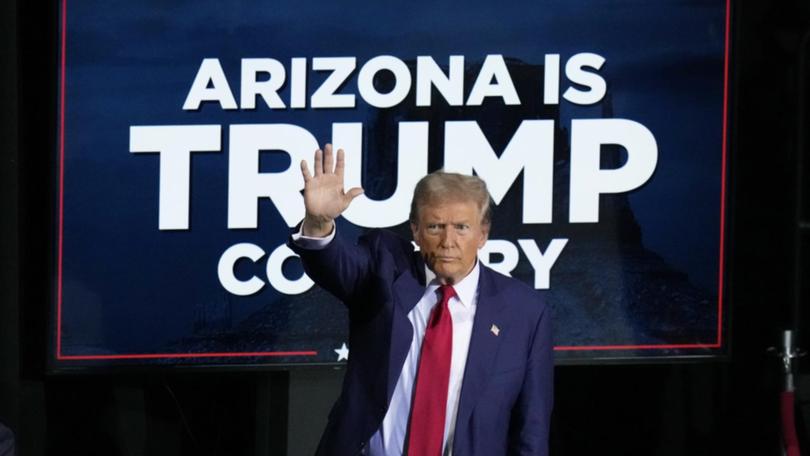
When announcing legal challenges to new laws on voting in the state of Michigan, Michael Whatley, one of the co-chairs of the RNC (alongside Mr Trump’s daughter-in-law), fulminated, “Gretchen Whitmer and Democrats have hung a new sign on Michigan’s door: Open For Cheating.” The laws in question, which change the procedures for recounts, do not go into effect in time for this year’s election anyway, points out Stephanie Chang, the Democratic state senator who wrote them.
The RNC has also launched an initiative called “Protect the Vote”, which aims to train 100,000 poll-watchers and attorneys in battleground states “to beat Democrats at their own game” and ensure that “Democratic tricks from 2020 won’t work this time”.
A spokeswoman for the RNC says that 175,000 people have volunteered so far. Cleta Mitchell, a former lawyer for Mr Trump who was on the call with Mr Raffensperger, now runs the Election Integrity Network, which aims to connect “volunteer citizen patriots…to learn how to ensure that elections are administered lawfully.”
“The leftist advocacy groups are screaming bloody murder whenever we push for such legal compliance,” she complains.
All this is vastly more organised than the shambolic, last-ditch efforts the RNC and Mr Trump made to challenge the election results in 2020 and makes possible a much more concerted legal fight.
Poll workers are expecting the worst.
“There’s a lot of bad actors out there, a lot of people just trying to work the system somehow to their advantage,” Mr Raffensperger says outside the electoral offices in Spalding County, where he and his colleagues have just conducted a “health check” of voting machines.
This year, he notes, some election officials in Georgia will be wearing lanyards equipped with panic buttons. Election offices are stocking an antidote to opioid overdoses after one received a letter laced with deadly quantities of fentanyl.
Counting on the counting
Nonetheless, Mr Raffensperger insists, the election will be sound. After all, he and other officials have been put on their guard and are far better prepared for meddling than last time.
In 2022 Congress amended the relevant laws to prevent some of the manoeuvres Mr Trump attempted in 2020.
The legislation made clear that the vice-president has no authority to disregard or alter any of the votes cast in the electoral college, and raised the number of congressmen needed to lodge an objection from one member from each chamber to a fifth of members from each chamber.
There are still procedural uncertainties and potential constitutional loopholes to be exploited. In their book “How to Steal a Presidential Election”, Lawrence Lessig, a professor at Harvard Law School, and Matthew Seligman of Stanford Law School argue that there is no foolproof mechanism to force a governor to certify the results in his or her state and that state legislatures can still simply order electors to disregard the popular vote and follow their instructions.
But voters have not put pro-Trump conspiracy theorists in charge in any swing states, and no state legislature is contemplating such radical legislation.
By the same token, although there have been instances of officials at the county level refusing to certify local votes, Derek Muller, a law professor at the University of Notre Dame, points out that, in the end, all the relevant deadlines have always been met.
It could be Democrats who try to stymie proceedings, especially if Mr Trump wins the electoral college but Ms Harris prevails in the popular vote or, worse, if the electoral college is tied and the arcane procedures that follow hand the election to Mr Trump (our model ascribes odds of 1-in-300 to this scenario).
They could, for instance, argue that Mr Trump is not eligible since the constitution bars those who have “engaged in insurrection or rebellion” against the government or “given aid or comfort to the enemies thereof” from holding government office.
But it is unlikely that Democrats would have the congressional majorities needed to take such a step and the party’s leading lights have so far dismissed the idea.
Circumstances are different now, too. The previous election took place during the pandemic. States had to revise procedures hastily, inviting suspicion and lawsuits.
Mr Trump is not president, so the Department of Justice will not be dragooned to aid his cause, a step Mr Trump considered in 2020 but abandoned when officials threatened to resign en masse.
In contrast to 2020, Mr Trump is encouraging his supporters to vote early and to vote by mail. That should help diminish a partisan split, whereby Republicans were more likely to vote in person.
That matters because counting postal votes involves more exacting procedures and so is slower. The effect of this in 2020 was for votes to skew more heavily Democratic the longer counts wore on.
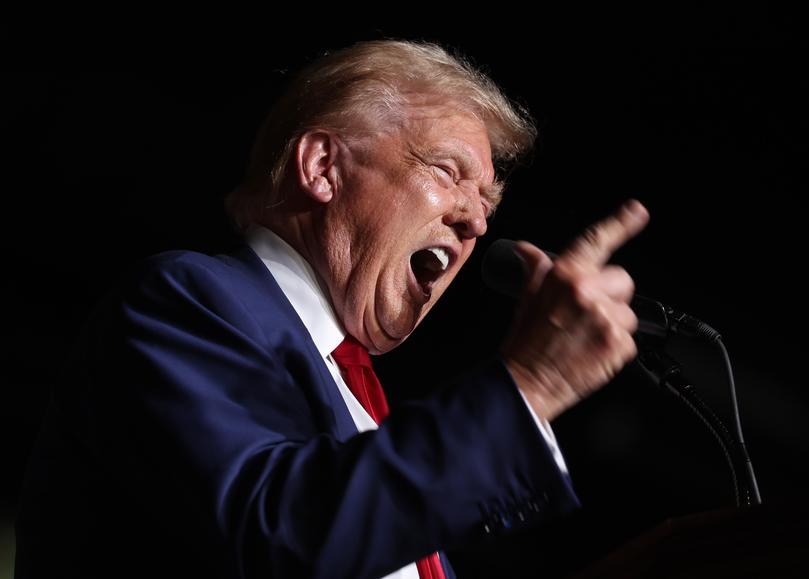
Mr Trump’s apparent lead in several states was gradually eroded and then overturned, a “blue shift” that people like Ms Bobb adduce as evidence that the Democrats cheated.
It is not just Mr Trump, but many of his allies who have found themselves in legal trouble after the attempted subversion of 2020. That should act as a disincentive to get involved in such schemes this time around.
Ms Bobb, for instance, was among 18 people charged in Arizona in April with conspiring to overturn the election result.
Similar prosecutions are under way in Georgia, Michigan and Nevada. Last year a jury granted damages of $148m to two election workers who had been groundlessly accused by Rudy Giuliani, one of Mr Trump’s most imaginative surrogates, of tampering with the vote in 2020.
They are now attempting to enforce the verdict by seizing Mr Giuliani’s property.
Despite the Supreme Court’s expansive view of Mr Trump’s immunity as president, he remains in legal jeopardy over his conduct during the previous presidential election.
By contrast, the courts have given short shrift to his claims that he was the victim of electoral fraud. That is why, on the whole, election lawyers think the chances of an unsuccessful candidate overturning an election using legal loopholes and constitutional trickery are slim.
“Given what we went through in 2020, I think people, if they’re vigilant and courts do their job again, we should make it through,” says Rick Hasen, a law professor at the University of California, Los Angeles.
But although a stolen election remains a mercifully remote prospect, the fact that Americans are having to assess the odds at all—and that diplomats in Washington are quietly requesting briefings on the question—is itself worrying.
Mr Trump’s efforts to “Stop the Steal” were alarming not because they were underpinned by strong legal arguments, but because he managed to win widespread and ardent support for his baseless claims among Republican voters and elites alike.
Polls consistently find that a majority of Republicans believe Mr Trump was robbed of victory in 2020. Many of those people fear that he will be this year, too. Republicans are more likely to trust Mr Trump than they are election officials, pollsters say.
If there is good faith among winners and losers, even a labyrinthine electoral system such as America’s will yield the right outcome. If that good faith evaporates, however, not even the best-designed system can cope.
